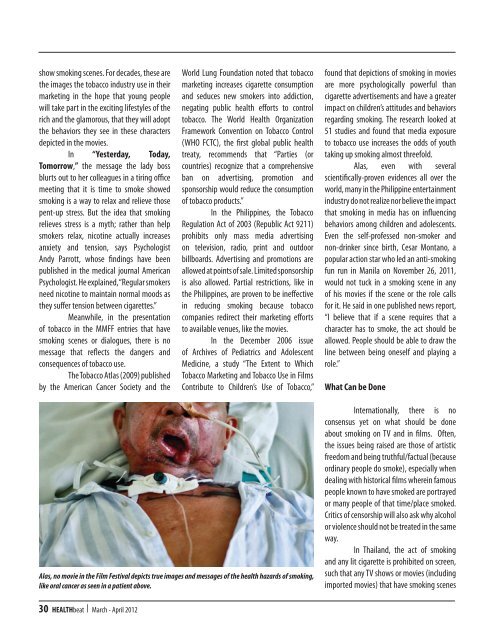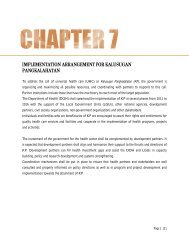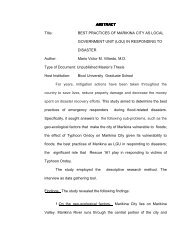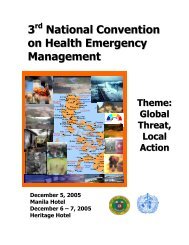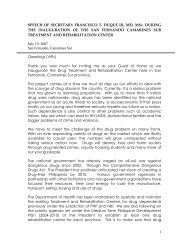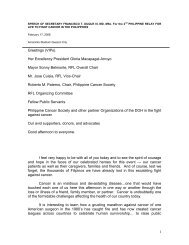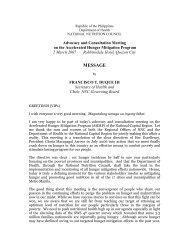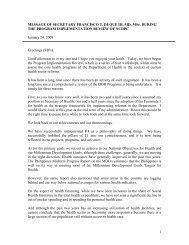show smoking scenes. For decades, these arethe images the tobacco industry use in theirmarketing in the hope that young peoplewill take part in the exciting lifestyles of therich and the glamorous, that they will adoptthe behaviors they see in these charactersdepicted in the movies.In “Yesterday, Today,Tomorrow,” the message the lady bossblurts out to her colleagues in a tiring officemeeting that it is time to smoke showedsmoking is a way to relax and relieve thosepent-up stress. But the idea that smokingrelieves stress is a myth; rather than helpsmokers relax, nicotine actually increasesanxiety and tension, says PsychologistAndy Parrott, whose findings have beenpublished in the medical journal AmericanPsychologist. He explained, “Regular smokersneed nicotine to maintain normal moods asthey suffer tension between cigarettes.”Meanwhile, in the presentationof tobacco in the MMFF entries that havesmoking scenes or dialogues, there is nomessage that reflects the dangers andconsequences of tobacco use.The Tobacco Atlas (2009) publishedby the American Cancer Society and theWorld Lung Foundation noted that tobaccomarketing increases cigarette consumptionand seduces new smokers into addiction,negating public health efforts to controltobacco. The World Health OrganizationFramework Convention on Tobacco Control(WHO FCTC), the first global public healthtreaty, recommends that “Parties (orcountries) recognize that a comprehensiveban on advertising, promotion andsponsorship would reduce the consumptionof tobacco products.”In the Philippines, the TobaccoRegulation Act of 2003 (Republic Act 9211)prohibits only mass media advertisingon television, radio, print and outdoorbillboards. Advertising and promotions areallowed at points of sale. Limited sponsorshipis also allowed. Partial restrictions, like inthe Philippines, are proven to be ineffectivein reducing smoking because tobaccocompanies redirect their marketing effortsto available venues, like the movies.In the December 2006 issueof Archives of Pediatrics and AdolescentMedicine, a study “The Extent to WhichTobacco Marketing and Tobacco Use in FilmsContribute to Children’s Use of Tobacco,”found that depictions of smoking in moviesare more psychologically powerful thancigarette advertisements and have a greaterimpact on children’s attitudes and behaviorsregarding smoking. The research looked at51 studies and found that media exposureto tobacco use increases the odds of youthtaking up smoking almost threefold.Alas, even with severalscientifically-proven evidences all over theworld, many in the Philippine entertainmentindustry do not realize nor believe the impactthat smoking in media has on influencingbehaviors among children and adolescents.Even the self-professed non-smoker andnon-drinker since birth, Cesar Montano, apopular action star who led an anti-smokingfun run in Manila on <strong>No</strong>vember 26, 2011,would not tuck in a smoking scene in anyof his movies if the scene or the role callsfor it. He said in one published news report,“I believe that if a scene requires that acharacter has to smoke, the act should beallowed. People should be able to draw theline between being oneself and playing arole.”What Can be DoneAlas, no movie in the Film Festival depicts true images and messages of the health hazards of smoking,like oral cancer as seen in a patient above.Internationally, there is noconsensus yet on what should be doneabout smoking on TV and in films. Often,the issues being raised are those of artisticfreedom and being truthful/factual (becauseordinary people do smoke), especially whendealing with historical films wherein famouspeople known to have smoked are portrayedor many people of that time/place smoked.Critics of censorship will also ask why alcoholor violence should not be treated in the sameway.In Thailand, the act of smokingand any lit cigarette is prohibited on screen,such that any TV shows or movies (includingimported movies) that have smoking scenes30 HEALTHbeat I <strong>March</strong> - <strong>April</strong> <strong>2012</strong>
are required to block out the hand or mouthwith the cigarette. This is rather ugly andquite distracting (but great for raisingawareness that smoking is bad), so that localproducers have made conscious efforts tonot have any smoking scenes in their films/shows.In China, the State Administrationof Radio, Film and Television released anorder in February 2011 directing producersto minimize plot lines and scenes involvingtobacco and show smoking only whennecessary for artistic purposes or characterdevelopment. Minors under age 18 cannotbe shown smoking or buying cigarettes, andcharacters may not smoke in public buildingsor other places where smoking is banned.In the US, Stan Glantz, professorof the Department of Medicine and directorof the Center for Tobacco Control Researchand Education at the University of CaliforniaSan Francisco (UCSF) and his group madethe following five reasonable, responsiblesteps to protect young audiences from onscreensmoking which were endorsed by theUS Centers for Disease Control on July 15,2011: 1) assigning R ratings to movies thatdepict onscreen smoking; 2) requiring antitobaccoads in movies that depict smoking;3) prohibiting on-screen display of tobaccobrands; 4) requiring producers to certify thatno one associated with a movie depictingtobacco use received compensation for it,and; 5) harmonizing the State movie subsidyprograms with the tobacco control programsby limiting eligibility for subsidies only totobacco-free movies.In India, the Ministry of Healthand Family Welfare has issued a notificationdated October 27, 2011 that mandates aU/A certification (universal/adult rating)shall be given for a film in which an actor/actors are shown smoking or using tobacco.A disclaimer of 20 seconds duration shall berequired in the beginning and middle of thefilm in the voice of the actor shown smokingor chewing tobacco. There shall also be ahealth warning scroll in legible and readablefont going across the scene as a ticker sayingsmoking causes cancer; smoking kills,tobacco causes cancer. As of this writing,this notification is being contested byfilmmakers.Tobacco-Free Movies?!?Tobacco-free movies may not bepossible in the Metro Manila Film Festivalat this time, but the pioneering effort tocall on filmmakers not to depict smokingin their films may be the start of somethingbig because it has already elicited healthypublic discussion and debate. Although thetobacco industry remains silent on the issuein media, the move has drawn flak fromthe movie industry but wide support fromtobacco control advocates and non-smokingpublic. This now gives an opportunity notonly to push for government action but alsoto encourage self-regulation.MMDA Chairman Tolentino hintedthat it is time for the movie industry torun the film festival by itself and withoutthe support of MMDA and the localgovernment units. This may be a good ideaconsidering that subsidies are provided bythe government, even for movies that depictsmoking scenes. It is about time to considersuch films as indirect tobacco advertisingand promotion vehicle, which is a violationof an existing law, and therefore should notbe eligible for any government subsidies ortax incentives.During Tolentino’s call, theDepartment of Health was also reportedto have consulted Grace Poe Llamanzares,chair of the Movie and Television Review andClassification Board (MTRCB), regarding theguidelines in the possible implementationof a <strong>No</strong> Smoking directive in films andtelevision programs. This would have beena good measure to prevent producers forincorporating smoking scenes. An R-18 or“For Adults Only” rating would not only limitviewership of minors, but would also meanlimited showing in cinemas because theleading chain of malls in the country whichcarry the most number of moviehousesnationwide, ban R-18 movies in theirefforts to make their malls family-friendly.However, the MTRCB has still to decide themerits of issuing tobacco-free guidelines.Let this be the time to educatethe filmmakers. Tobacco control advocatesshould exert efforts in educating filmmakerson the harmful effects of tobacco use andthe evidences that smoking scenes have onsmoking initiation and craving to smoke.This strategy may encourage them not toshow smoking scenes or depict the truepicture of diseases and deaths broughtabout by smoking in their movies.And finally, in a country wherepolitics and showbiz are inter-related asmany politicians crossover to the otherfield almost instantly, actor-politicians, likeGovernor ER Ejercito, should be encouragedto push forward public health and welfare bynot being seen in movies as characters whouse and promote a product that is not only ahealth hazard but also deadly.Last February, CongressmanAurelio Gonzales Jr. filed a House Resolutionformalizing the appeal that seeks to put anend to the negative image of congressmenas seen in movies and television shows. Heexplained that the bad portrayals have beenunfair to legislators and have only taintedthe names of House members who workhard for their constituents. Well maybe, justmaybe, legislators and other political leadersshould also be thinking and working hardto put a stop in showing tobacco use in allforms of media for the sake of all Filipinos!Weeeeh... Hindi nga?!?<strong>March</strong> - <strong>April</strong> <strong>2012</strong> I HEALTHbeat 31


